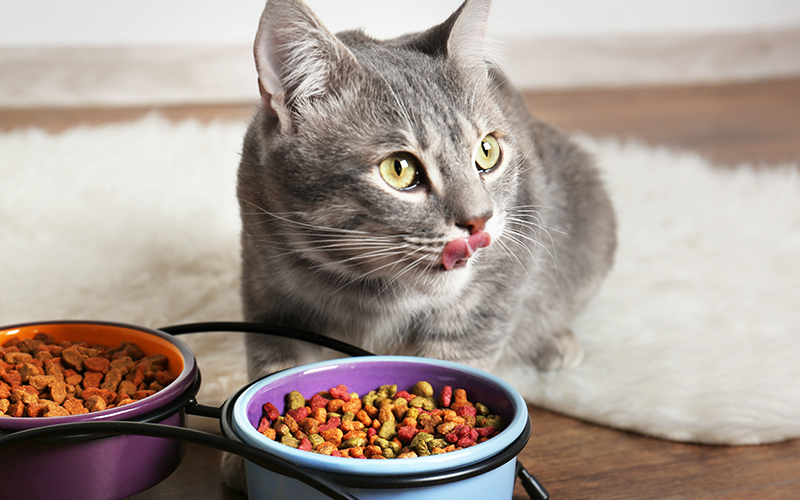Tips For Selecting Food That Will Fit Your Pet's Needs

Discuss diet with your primary care veterinarian
Your pet is an individual, and it is very likely that many food choices are available. Some pets have specific nutritional needs that make dietary options more limited. Your veterinarian is the best source of information regarding the appropriate diet for your specific pet. Many factors are involved in choosing a food, including economics, availability, any health issues that may need to be addressed with diet, your pet’s preference, and your personal philosophies. For more information, see the following article:
Global Nutrition Guidelines (wsava.org)
How much to feed my pet
While there are ways to calculate the assumed requirements of an average dog or cat, the exact calorie needs of any individual pet depend on genetics, environment, activity level, and life stage. It is important to keep in mind that foods vary widely in energy density, with different kibbles ranging from below 300 to more than 700 Calories per cup! Calories in canned food can also vary widely depending on the can size and nutrient content. The calorie content of the specific food you are using should be determined in order to avoid over- or underfeeding. In some cases, this information will be on the label of the pet food. The prevention of obesity is very important for maximizing the health and lifespan of your pet. You should regularly evaluate your pet to ensure a proper body condition. Your veterinarian can help you determine the proper weight for your individual pet. However, for ensuring that your pet is in optimal body condition, you should easily be able to feel the ribs, and your pet should have an hourglass shape when viewed from above.
Adding supplements to your pet’s diet
If your pet is eating a complete and balanced commercially available pet food, supplements are not recommended unless specifically recommended by your veterinarian. This reduces the chances of nutrient excesses and adverse nutrient / medication interactions. Talk to your veterinarian if you are interested in using a particular supplement for your pet, and keep your veterinarian informed if you are giving your pet any supplement. This is important information for him or her in order to be able to optimally care for your pet.
Choosing raw vs. canned foods
Raw diets, both home-prepared and commercial, have become more popular. Advocates of raw diets claim benefits ranging from improved longevity to superior oral or general health and even disease resolution. However, proof for these purported benefits is currently restricted to testimonials, and no published peer-reviewed studies exist to support claims made by raw diet advocates. No studies have examined differences in animals fed raw animal products to those fed any other type of diet (kibble, canned, or home cooked) with the exception of looking at the effects on digestibility. Some raw meats (but not other uncooked foods like grains or starches) can be slightly more digestible than cooked meat.
There are risks and concerns associated with the feeding of raw diets. One of these is the risk of nutritional imbalances, which is a reality for both home-prepared and commercial raw meat diets. Another important risk is related to bacterial or parasitic contamination. Of course, food poisoning is also a major concern for people, and the public health aspects of feeding raw foods to pets cannot be overlooked. Safe and proper handling of raw foods is crucial for reducing the risk, but safety cannot be guaranteed. At this time, the vast majority of purported benefits of feeding raw foods remain unproven, while the risks and consequences have been documented. It data-sf-ec-immutable="" is best to discuss the choice of feeding raw foods with your veterinarian so that an informed decision can be made with regard to your pet’s diet.
Treats and the Part They Play In Your Pet’s Diet
When you as a pet owner visit your veterinarian, there should always be a discussion about what you are feeding your cat or dog. This involves information about not just the main diet and amount, but also any treats, table scraps, food for training, food for medication administration, dietary supplements, and any other food or treats. The reason for having a discussion with your vet is that some treats may not be appropriate for your pet. In addition to the potential that a treat contains a toxic food such as raisins, grapes, or certain artificial sweeteners, treats can be problematic in terms of the number of calories that they contain and in terms of the nutrients that they contain. If your pet is overweight, treat calories can contribute to weight gain. If a pet has a health condition such as urinary stones, gastrointestinal disease, food allergies, or chronic kidney disease, the nutrients and ingredients in treats can negatively impact the health of the animal. Raw meat-based treats may also cause additional issues, such as infections from bacterial contamination, or gastrointestinal obstruction or perforation from bones.
In addition, treats are frequently not complete and balanced. That means they may not contain all of the proper nutrients that a dog or cat needs, and/or may not contain nutrients in the proper proportions. Treat calories should make up no more than 10% of total daily calories to avoid unbalancing the diet as a whole.
Even if your pet is healthy, you should discuss treat options with your vet to ensure that you help your pet stay as healthy as possible
Articles by Specialty
- Cardiology (18)
- Large Animal Internal Medicine (23)
- Neurology (16)
- Oncology (20)
- Small Animal Internal Medicine (25)
Articles by Animal
- Cats (35)
- Dogs (47)
- Farm Animals (5)
- Horses (12)
